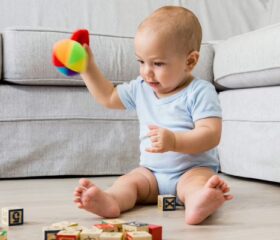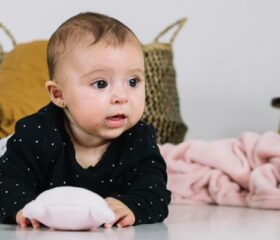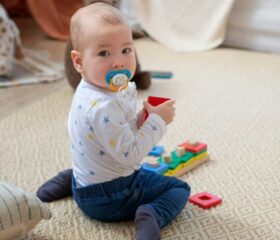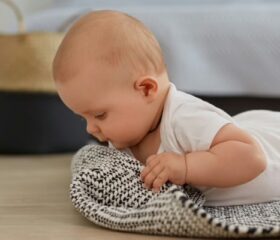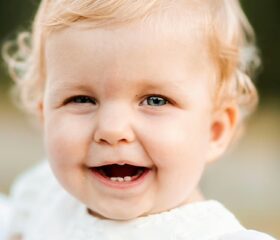When Do Babies Start Laughing and Smiling?
Few things will bring you as much joy as your baby’s first sweet, silly laugh—but when can you expect to hear it?
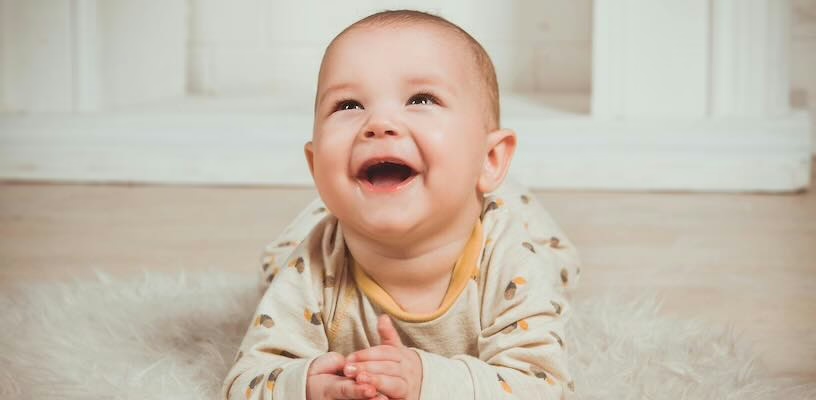
Laughter is more than just your baby showing you she has a good sense of humor. It’s an important milestone for her social and emotional development. Above all, it lets you know she’s happy and enjoying herself.
Here’s when you can expect to hear your baby’s first giggle and how to crack her up.
When do babies start laughing?
Since all babies develop differently, it’s difficult to determine exactly when you’ll hear your child’s first chuckles. Still, the odds are good you’ll hear them within her first 6 months, although not right away.
How your baby’s laughter will develop
Here’s a general timeline of when most babies start laughing: 1
- Newborn to 2 months old: At first, your baby will stay busy learning about the world through her senses. She’ll start recognizing your voice and mimicking your facial expressions, especially your smile, during these first weeks, but won’t actually laugh yet. This is called the social smile.
- 2 months to 4 months old: It’s time for cooing and gurgling! At this stage, your baby will experiment with sounds and learn how to use her mouth and throat. Around 4 months, many babies let out their first short chuckle or giggle in response to something funny. 2
- 4 months to 6 months old: By 6 months, most babies let out full laughs in response to funny noises, gentle tickles, and games like peek-a-boo.
These are, of course, just guidelines. Some babies might laugh earlier, while others might take a bit longer. If you’re at all concerned, your pediatrician is always there to give you guidance.
Premature babies have different developmental timelines
If your baby was born prematurely, you’ll need to use her adjusted age to track her development. Say your baby was born 4 weeks early, for example. At 2 months old (8 weeks), her adjusted age would actually be 4 weeks old. 3
What makes most babies laugh?
What tickles a baby’s funny bone? While your baby’s earliest laughs might seem random, she’ll laugh in reaction to all kinds of stimulus, such as:
- Sensory experiences: Babies love to explore new sensations and are easily surprised by new things. A funny face, a silly sound, or the feeling of a raspberry blown on her belly can all trigger a giggle.
- Physical play: Just like older children, babies laugh when they’re having fun. Simple forms of play like gentle tickling, bouncing on your knee, playing pat-a-cake, or taking your baby on the bucket swings at the park (once she can sit up independently) can all get her laughing.
- Emotional connection: Babies love interacting with their favorite people. Your attention, smiles, and playful antics may be all it takes to bring a smile to her face.
- Learning and discovery: As babies develop, they begin to understand object permanence (knowing that people and objects still exist when they can’t see them) and cause and effect. Games like peek-a-boo or knocking down a tower of blocks become hilarious because they now “get” the surprise element. 4
- Brain development: Babies can be surprisingly chatty during their sleep, gurgling, cooing, and even smiling and laughing. These laughs are usually involuntary and related to brain development. 5
As she gets older, your baby will start laughing, learning what’s meant to be funny and how to get your attention with humor. Keep encouraging her to laugh and engaging with her playful antics, and her social development and communication skills will only get better. 6
Laughter and your baby’s development
As your child grows, she’ll be able to understand and replicate more complicated forms of humor, like visual gags or wordplay. By engaging with her jokes and games early on, you’ll give her feedback on what’s funny and what kind of jokes are appropriate for different situations. 6
Even if you aren’t trying to actually make your baby laugh, you should still engage with her throughout the day. Talk to her, sing, and describe what you’re doing. She’ll begin picking up on your tone long before she understands the words. The more you engage with her, the more likely she is to laugh.
How to make your baby laugh
You might be pretty funny in your own age group, but babies are a different crowd. To save yourself from bombing, here are a few tried-and-tested methods that should be able to rouse a chuckle out of even the sternest of babies:
- Funny faces: Don’t be shy—babies love this. Exaggerate your expressions and make silly faces.
- Silly sounds: Blow raspberries, click your tongue, or make animal noises.
- Peek-a-boo: Again, once your baby understands object permanence, this one is always a hit.
- Tickles: If actual jokes are falling flat, try a light tickle on the belly or soles of the feet.
- Raspberry kisses: Gently blow raspberries on her tummy or neck.
- Bouncing: Gently bounce your baby on your lap and you’ll be sure to send her into hysterics.
- Pat-a-cake: This classic hand-clapping game is always a winner.
- Stacking and knocking down: Build a tower of blocks and then dramatically knock it down (bear in mind that you’ll also need to teach your baby when it’s not appropriate to knock things over).
Try combining these to make it extra fun for your baby and mix things up for you, too. That said, try to avoid overstimulating her.
If your baby’s well-fed, well-rested, and content, she’s far more likely to be in the mood to laugh. It’s best to schedule your playtimes when she’s alert and happy and not too close to her bedtime.
When to seek expert advice about your baby’s development
It’s normal for some babies to start laughing later than others—some are simply more serious by nature. Babies also develop stranger anxiety around 8 months, so if yours is reticent around other family members or friends, it could be because she’s less social around people she isn’t familiar with. 7
However, it’s a good idea to talk to your pediatrician if your baby isn’t laughing by 6 months and doesn’t coo, smile, or engage with you. They’ll assess her development and give you advice on the next steps.
Is not laughing a sign of autism spectrum disorder?
It’s very tricky to spot the early signs of autism spectrum disorder (ASD) in babies. However, failure to laugh can sometimes be one. A baby with ASD might not laugh or smile in response to what you do, but there are usually other signs.
Chat with your pediatrician if your baby still won’t engage with you by 15 months old, or if she: 8 9
- Is often overly fussy or difficult to soothe
- Is unenthusiastic about trying new things
- Has very limited eye contact
- Doesn’t show interest in objects of other people’s attention
- Rarely babbles or makes gestures
- Has a delayed response (or doesn’t respond at all) to her name
- Has strong sensitivities to texture and touch
- Gets upset by everyday noises
Your pediatrician can assess your baby for ASD and advise you on the next steps if she does show the signs of having autism.
Final thoughts
Your baby’s first laugh is one of her most exciting milestones and might be the most fun one to take part in. When you engage with her by talking to her and making her laugh, you help her develop social skills and her sense of humor.
Before you know it, your baby will take over the show and make you laugh instead!
Article Sources
- Early Connections. "Infant (0-6 Months)" Retrieved September 25, 2025.
- Missouri State University. "Is Your Baby on Track?" Retrieved September 25, 2025.
- HealthyChildren.org. "Corrected Age For Preemies" Retrieved September 25, 2025.
- UConn Kids in Developmental Science. "Humor and Child Development" Retrieved September 25, 2025.
- American Association for the Advancement of Science. "Primary Role of Sleep Changes in Early Childhood" Retrieved September 25, 2025.
- Children’s Minnesota. "Encouraging Your Child’s Sense of Humor" Retrieved September 25, 2025.
- Office of Child Development. "Stranger Anxiety" Retrieved September 25, 2025.
- Autism Speaks. "Signs of autism" Retrieved September 25, 2025.
- UC San Diego Department of Neurosciences. "Early Identification of Autism" Retrieved September 25, 2025.
